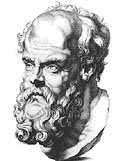![]()
![]()
Ancient Philosophy
Socrates - Euthyphro
Primary Source:
- Plato, Euthyphro from Baird and Kaufmann, Ancient Philosophy, pp. 76-88.
Secondary Source:
- Irwin, “Morality and Religion” and “The Unity of Morality” from Classical Thought, pp. 75-79.
Background:
From John M. Cooper’s Routlegde Online Encyclopedia article on Socrates:
Socrates, an Athenian Greek of the second half of the fifth century BC, wrote no philosophical works but was uniquely influential in the later history of philosophy. His philosophical interests were restricted to ethics and the conduct of life, topics which thereafter became central to philosophy. He discussed these in public places in Athens, sometimes with other prominent intellectuals or political leaders, sometimes with young men, who gathered round him in large numbers, and other admirers. Among these young men was Plato. Socrates' philosophical ideas and – equally important for his philosophical influence – his personality and methods as a ‘teacher’ were handed on to posterity in the ‘dialogues’ that several of his friends wrote after his death, depicting such discussions. Only those of Xenophon (Memorabilia, Apology, Symposium) and the early dialogues of Plato survive (for example Euthyphro, Apology, Crito). Later Platonic dialogues such as Phaedo, Symposium and Republic do not present the historical Socrates' ideas; the ‘Socrates’ appearing in them is a spokesman for Plato's own ideas.
Socrates’ discussions took the form of face-to-face interrogations of another person. Most often they concerned the nature of some moral virtue, such as courage or justice. Socrates asked what the respondent thought these qualities of mind and character amounted to, what their value was, how they were acquired. He would then test their ideas for logical consistency with other highly plausible general views about morality and goodness that the respondent also agreed to accept, once Socrates presented them. He succeeded in showing, to his satisfaction and that of the respondent and any bystanders, that the respondent’s ideas were not consistent. By this practice of ‘elenchus’ or refutation he was able to prove that politicians and others who claimed to have ‘wisdom’ about human affairs in fact lacked it, and to draw attention to at least apparent errors in their thinking. He wanted to encourage them and others to think harder and to improve their ideas about the virtues and about how to conduct a good human life. He never argued directly for ideas of his own, but always questioned those of others. Nonetheless, one can infer, from the questions he asks and his attitudes to the answers he receives, something about his own views.
Dialogue Outline and Questions:
- Characters and Setting (2a-5c)
- Where does this dialogue take place?
- Why is Socrates doing there? Why does this surprise Euthyphro?
- Why is Euthyphro there? Why does this surprise Socrates?
- What does Euthyphro promise to teach Socrates? Why is this relevant for Socrates to learn?
- The Request for a Definition (5c-6e)
- Right away, Socrates suggests three premises concerning piety, which Euthyphro immediately accepts. What are these three premises?
- After this, Euthyphro provides his first definition of piety and impiety. What is it? Why does this definition fail to satisfy Socrates?
- The Argument (6e-15c)
- Second Definition (6e-8b)
- What is the second definition of piety and impiety provided by Euthyphro? Why does this definition fail to satisfy Socrates?
- In the process, Socrates also distinguishes two types of arguments. How to people resolve quarrels about measurement according to Socrates? But what kind of quarrels are not so easily settled, but often lead to conflicts? Can you guess how Socrates thinks this quarrels ought to be settled? (Hint: this whole dialogue is an example of such a quarrel.)
- First Interlude (8b-9c)
- Here Socrates further explains his reasoning for rejecting the second definition, since Euthyphro does not “get it” the first time. (I.e., Socrates is just repeating and clarifying his previous argument and not presenting a new one.)
- Third Definition (9c-11b)
- What is the third definition of piety and impiety provided by Euthyphro? Why does this definition fail to satisfy Socrates? What distinction does Socrates present to refute this definition?
- Second Interlude: Socrates as Daedalus (11b-d)
- Here Euthyphro complains that Socrates is confusing him. So Socrates says he’ll help out Euthyphro.
- Justice and Piety (11e-12e)
- Here Socrates introduces the concept of justice and its relation to piety. How are these two things related to each other?
- Fourth Definition (12e – 14b)
- What is the fourth definition of piety and impiety provided by Euthyphro? Why does this definition fail to satisfy Socrates?
- At the end of this section, realizing he’s in trouble, Euthyphro presents a fifth definition. What is this fifth definition?
- Fifth Definition (14b – 15c)
- Why is Socrates not satisfied by this fifth definition?
- Second Definition (6e-8b)
- Conclusion (15c – 16a)
- Realizing he is “full of it” and cannot answer Socrates, Euthyphro runs away.
I love Apache! So should you!
![]()



